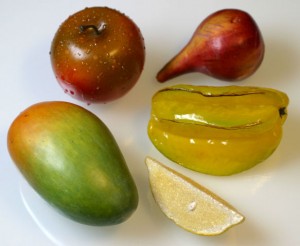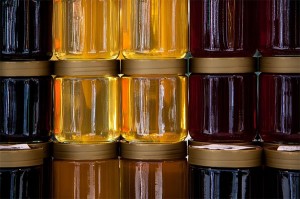
Timber houses in the form of the Hebrew
letter Bet
© The Beit Project, photo: David Gauffin
Beit is the name of a European project thought up by David Stoleru, a Jewish architect from France. The name refers to the Hebrew word for house “Bajit” as well as to the letter “Bet” of the Hebrew alphabet. Stoleru has designed small timber houses that are somewhat reminiscent of the cozy beach basket chairs common on Germany’s Baltic coast. Seen from the side, they resemble the symbol ב for Bet, the first letter of the word beit. Several classes of eighth-graders set up such houses in the Heckmann Höfe in the Mitte district of Berlin, as a means to temporarily bring into the public sphere their nearby school, whose Hebrew name, Beit Sefer, literally means “House of the Book.” Here, for two days, they devoted themselves to the task of uncovering traces of the Jewish community in the local cultural and urban heritage.
It proved to be a strenuous two days’ work, during which the schoolchildren were almost constantly on the go and often had to push themselves to their limits. (more…)
or “Being who I am”
“The night before I fly to Germany to see my grandfather Mosha, I meet someone, take him home with me, and for the first time in my life, I sleep with a man.”

© weissbooks.w
Frankfurt am Main
This sentence begins the first chapter of the 2010 novel Sag es mir (Tell it to me) by Vanessa F. Fogel. The author was born in 1981 in Frankfurt and grew up in Israel. She introduces the first-person narrator of this autobiographical novel both as a granddaughter and as a confident young woman right from the start. And despite her imminent trip to the sites of extermination – she meets her grandfather in Berlin and they travel together to Poland – her emphasis is on vitality and the joys of living.
The Frankfurt publishing house weissbooks has now taken on another Jewish writer of “the third generation.” Channah Trzebiner is a lawyer, also born in 1981 in Frankfurt, where, unlike Fogel, she still lives. She has written Die Enkelin (The Granddaughter), which is more of “a kind of inner monologue” than a novel. This book also begins confidently: “I accept the woman that I am.” At once, however, the author alerts her reader to the difficult process underlying this claim:
“For years I cut off my connection to the innermost ‘I’ […], so that I could be the substitute for a life ended by murder. How I could have done otherwise? I’m called Channah after my grandmother’s youngest sister […].”
(more…)

Apple, mango, fig, star fruit, lemon
We posed this question to employees of the Jewish Museum Berlin. Some answered curtly, such as one colleague who “doesn’t usually do anything (aside from dipping a few pieces of apple in honey…).” Others answered indirectly via an out-of-office message which ended with “Cordial greetings and Shanah Tovah.” Here are some additional responses:
“I’m going to go to my grandmother’s for Rosh ha-Shanah, like every year. With one difference: I’m hoping that she will follow my advice this year and forget to warm up the gefilte fish before serving it, because it tastes better cold.” Alina Gromova, Academic Employee in the Fellowship Program, and Guide

Honey, source: Pixabay, CC0 license
“Like every year, we observe erev Rosh ha-Shanah at a dinner with friends, which we sanctify by reciting various blessings. We dip apples in honey and buy rare fruit which relinquish their mysteries upon consumption. We celebrate the New Year culinarily, with new, unknown foods to discover, resulting in a kind of biology intelligence test. Unfortunately there are never any kreplach to follow because no one knows how to prepare them anymore, and the gefilte fish comes, if at all, out of a jar. Making it would take days, but worse, cooking fish gives off a smell which fills the entire house, and might drive away the neighbors, and not only the disagreeable ones… The remaining array of dishes is unspectacular. Over the next two days, some of the dinner guests attend synagogue – chosen either out of nostalgia for childhood memories, or out of liturgical interest.” Cilly Kugelmann, Program Director (more…)



